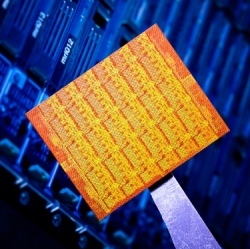
Yo Tanaka from the RIKEN Quantitative Biology Center has developed a reliable and durable system for incorporating glass microfluidics into lab-on-a-chip devices.
Lab-on-a-chip devices are microfluidic cells that incorporate pipes, reaction vessels, valves and a host of other implements typically found in laboratories. These components are typically carved into an inexpensive flat plastic plate, made of polydimethylsiloxane (PDMS), to enable efficient processing of microliter-volume samples.
Plastics, however, have several disadvantages, including degradation when exposed to reactive chemicals and a tendency to adsorb sample molecules before they can be analyzed. They can also interfere with analysis techniques that rely on shining a light through the device due to their imperfect transparency, and are difficult to fabricate due to their fragility.
Glass is an attractive alternative because it is chemically resistant, transparent to light and also capable of withstanding higher fluid pressures than PDMS. Producing flexible and durable glass valves, however, has proved difficult.
